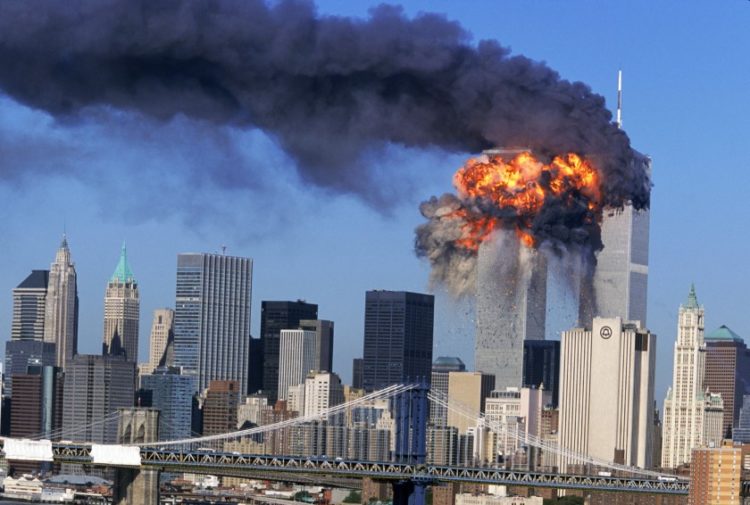Yahoo News recently reported a mistake they found in an FBI court filing. In the filing, the FBI neglected to redact mention of the name of Mussaed Ahmed al-Jarrah, a Saudi diplomat whom FBI agents had suspected of directing material support to two of the Saudi 9/11 hijackers that crashed a plane into the Pentagon, killing 125. The court filing has since been removed but Pandora’s box has already reopened.
Following the long-running 9/11 investigation is a complicated, tragic, and murky affair. Of critical importance for families of the 9/11 victims is determining the extent of Saudi government involvement or complicity in the terrorist attacks that killed their loved ones. In their quest for closure, the families of victims have worked with former FBI Special Agents who were assigned on the 9/11 cases around the time of the attacks. A long suspicion, but one that is extraordinarily difficult to prove, has been that the hijackers — who were predominantly Saudi — were linked to the Saudi government.
For years, these former agents and the victims’ families have attempted to uncover any nexus between the Saudi government and the hijackers. The FBI’s recent mistake in failing to redact mention of the Saudi diplomat’s name offers them a possible breakthrough in their quest for closure.
While families of the victims sought answers themselves, the FBI was also keen on determining any possible connection between the Saudi government and the hijackers, and probed for possible links around 2012. In this investigation, the FBI focused on two Saudi individuals they suspected of assisting the two terrorists that hijacked the American Airlines plane that crashed into the Pentagon.
The first individual, Fahad al-Thumairy, was a Saudi Islamic Affairs official and radical cleric who reportedly served as the imam of a Los Angeles mosque. The second individual, Omar al-Bayoumi, was a suspected agent of the Saudi government.
In this supposed hierarchy, the two terrorists were supported by al-Thumairy and al-Bayoumi, who, in turn, received material support from al-Jarrah, the Saudi diplomat in Washington. This was evidenced by at least one instance in January 2000, when the two hijackers flew to Los Angeles and were subsequently assisted by al-Bayoumi, who found them an apartment, lent them money, and established bank accounts for them.
Evidence uncovered by the FBI during the investigation also led them to believe that al-Thumairy and al-Bayoumi had been tasked to provide such support by a third man, possibly al-Jarrah.
This third man, al-Jarrah, was a mid-level Saudi Foreign Ministry diplomat assigned to the Saudi Embassy in D.C. His reported duties included overseeing the Ministry of Islamic Affairs employees at Saudi-funded mosques and Islamic centers in the United States. It is here that the ostensible link between al-Jarrah, al-Thumairy and al-Bayoumi is made, given the latter’s role as a radical cleric and Ministry of Islamic Affairs employee in Los Angeles.
According to one of the former FBI Special Agents assisting the victims’ families, al-Jarrah was “responsible for the placement of Ministry of Islamic Affairs employees known as guides and propagators posted to the United States, including Fahad al-Thumairy.” According to Yahoo News, this agent also concluded in the course of her own investigation, that al-Jarrah was providing support to and possibly handling al-Thumairy.
Reportedly there is strong evidence of meetings and communications among al-Jarrah, al-Thumairy, and al-Bayoumi regarding their assistance to the two hijackers. Even further, it was discovered that at one point, al-Jarrah had flown to Los Angeles to meet with al-Thumairy. However, a major point of contention within the FBI was determining whether or not al-Jarrah knew that the two Saudi hijackers were members of al-Qaeda and were actively planning an attack on U.S. soil.
While circumstantial evidence suggests official Saudi complicity in the 9/11 attacks, the difficulty lies in presenting the hard evidence needed to continue the discussion regarding U.S. foreign policy with the Kingdom of Saudi Arabia. It must be noted that 15 of the 19 hijackers were of Saudi origin, and that Saudi Arabia had “long been viewed as the primary source of al-Qaeda funding.” As SOFREP has previously reported regarding the present-day Saudi regime, the House of Saud with its export of fundamentalist Islam, Wahabbism, does not appear to be a friend of Western values.
Already have an account? Sign In
Two ways to continue to read this article.
Subscribe
$1.99
every 4 weeks
- Unlimited access to all articles
- Support independent journalism
- Ad-free reading experience
Subscribe Now
Recurring Monthly. Cancel Anytime.
While the 9/11 commission ultimately could not find evidence supporting the assertion that the Saudi government-funded al-Qaeda, the inferences remain readily available and become all the more potent when considering the largely one-way relationship between the United States and Saudi Arabia. The kingdom reaps huge financial benefits from U.S. dependency on its oil exports and from the protection provided by U.S. military presence in the country, which aids the Saudi regime in its struggle against the regional hegemon and its religious competitor, Iran.
Despite the Iranian threat, the need for U.S. military presence in the kingdom — other than as soft power leverage — no longer appears crucial. Geopolitically, there is sufficient U.S. military presence elsewhere in the region, for example in Qatar, Oman, the Horn of Africa, Iraq, Jordan, Israel, Turkey, etc., to offset Iran. This arguably negates the need for a U.S. contingent in Saudi Arabia.
Given the regime’s shoddy human rights record and its reported slew of abuses, its highly suspect ties to the export of violent fundamentalist religious terror, and numerous examples of personal indiscretion on behalf of the regime’s de facto ruler, the crown prince, it is this author’s strong opinion that the U.S. reconsider its position with respect to the House of Saud.
Thanks for listening.










COMMENTS